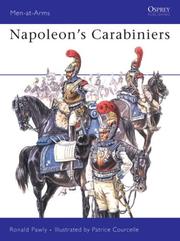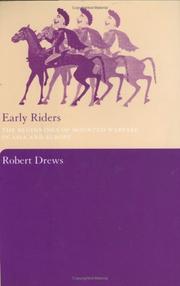| Listing 1 - 10 of 32 | << page >> |
Sort by
|

ISBN: 1780965559 1780965567 9781780965550 1841767093 9781841767093 9781780965567 Year: 2014 Publisher: London Osprey Pub.
Abstract | Keywords | Export | Availability | Bookmark
 Loading...
Loading...Choose an application
- Reference Manager
- EndNote
- RefWorks (Direct export to RefWorks)
Carabiniers were the elite of the heavy horse, and fought in most of Napoleon's greatest battles from Austerlitz to Waterloo. This book incorporates new research and striking illustrations to tell the story of these brave men and detail their uniforms and equipment.
Book
ISBN: 1910294349 9781910294345 Year: 2013 Publisher: Solihull
Abstract | Keywords | Export | Availability | Bookmark
 Loading...
Loading...Choose an application
- Reference Manager
- EndNote
- RefWorks (Direct export to RefWorks)
Nominated for the Royal Historical Society Whitfield Book Prize 2013Nominated for the NYMAS Arthur Goodzeit Book Award 2013Nominated for the SAHR Templer Medal 2013This book provides the first comprehensive study of the British Army's horse services between 1875-1925, including the use of horses in the 1899-1902 Anglo-Boer and the 1914-18 wars. There is a particular focus on the military procurement of horses in relation to the domestic horse breeding industry, foreign supply in times of war, the debate about mechanization versus the horse and an integrated military transport system. During th
Great Britain. --- Cavalry --- History. --- Great Britain --- History, Military
Book
ISBN: 1442245352 9781442245358 9781442245341 1442245344 Year: 2016 Publisher: Lanham
Abstract | Keywords | Export | Availability | Bookmark
 Loading...
Loading...Choose an application
- Reference Manager
- EndNote
- RefWorks (Direct export to RefWorks)
This is the story of the last mounted American troops to see action in battle, when, in 1941, six-hundred men and their horses held off the Japanese invasion of Luzon in the Philippines just long enough to allow General Douglas MacArthur's forces to withdraw to Bataan. This stirring account of the Philippine campaign is military history at its best.
World War, 1939-1945 --- Campaigns --- Cavalry operations. --- United States.
Book
ISBN: 1574416405 9781574416404 9781574416350 Year: 2016 Publisher: Denton, Texas University of North Texas Press
Abstract | Keywords | Export | Availability | Bookmark
 Loading...
Loading...Choose an application
- Reference Manager
- EndNote
- RefWorks (Direct export to RefWorks)
Mexican War, 1846-1848 --- Frontier and pioneer life --- Law enforcement --- Cavalry --- Cavalry operations. --- History --- United States --- Texas --- History, Military
Book
ISBN: 1476633576 9781476633572 9781476670829 147667082X Year: 2018 Publisher: Jefferson, North Carolina
Abstract | Keywords | Export | Availability | Bookmark
 Loading...
Loading...Choose an application
- Reference Manager
- EndNote
- RefWorks (Direct export to RefWorks)
"During the Chickamauga Campaign, General David Stanley's two Union cavalry divisions battled Nathan Bedford Forrest's and Joseph Wheeler's cavalry corps in some of the most difficult terrain for mounted operations. The Federal troopers, commanded by George Crook and Edward McCook, guarded flanks of the advance on Chattanooga, secured the crossing of Tennessee River, then pushed into enemy territory"--
Chickamauga, Battle of, Ga., 1863. --- United States. --- United States --- Georgia --- History --- Cavalry operations.

ISBN: 161234058X 9781612340586 157488624X 9781574886245 1574886258 9781574886252 Year: 2004 Publisher: Washington, D.C. Brassey's
Abstract | Keywords | Export | Availability | Bookmark
 Loading...
Loading...Choose an application
- Reference Manager
- EndNote
- RefWorks (Direct export to RefWorks)
Revered by some, notorious to others, Nathan Bedford Forrest has long been considered one of the greatest soldiers of the American Civil War. Historian Robert Browning introduces readers to the facts and myths thatsurround this controversial man. Responsible for his family at a young age, Forrest scratched out a living on the frontier wilderness of Tennessee and Mississippi. He quickly developed traitsùself-reliance, decisiveness, and assertivenessùthat would later make him famous. Whether he was stalking a panther or challenging a gun-wielding assailant, Forrest realized that boldness was hal
Generals --- Forrest, Nathan Bedford, --- Confederate States of America. --- United States --- History --- Cavalry operations.
Book
ISBN: 1611214122 9781611214123 9781611214116 1611214114 Year: 2019 Publisher: El Dorado Hills
Abstract | Keywords | Export | Availability | Bookmark
 Loading...
Loading...Choose an application
- Reference Manager
- EndNote
- RefWorks (Direct export to RefWorks)
"George Armstrong Custer rose to prominence during the American Civil War when he was promoted from Captain to Brigadier General in June, 1863. He distinguished himself the Battles of Gettysburg, Buckland Mills, Yellow Tavern, Tom's Brook and Appomattox. After the war, Custer led the 7th U.S. Cavalry on the Plains and met his fate in at the Little Bighorn against Sioux and Cheyenne Warriors."--Provided by publisher.
Custer, George A. --- United States. --- Officers --- United States --- History --- Cavalry operations. --- Campaigns.
Book
ISBN: 1501757954 160909025X 9781609090258 9781501757952 9780875804415 0875804411 Year: 2011 Publisher: DeKalb Northern Illinois University Press
Abstract | Keywords | Export | Availability | Bookmark
 Loading...
Loading...Choose an application
- Reference Manager
- EndNote
- RefWorks (Direct export to RefWorks)
In 1861, Francis Moore appeared to be a perfectly ordinary, twenty-three year old man: a carriage maker in the bustling Mississippi River town of Quincy, Illinois. And there he might well have lived out his life in unadventurous comfort. But then the Civil War burst out, and Moore, along with most of his friends, like young men North and South, rushed to enlist in the army. His cavalry regiment soon set off for what proved to be four years of warfare, plunging him into harrowing experiences of battle that would have been unimaginable back in his small hometown and that uprooted him, body and soul, for the remainder of his life.Enter The Story of My Campaign, the remarkable Civil War memoir of Captain Francis T. Moore, which historian Thomas Bahde here offers in an original edition to contemporary readers for the first time. Moore began the war as a private in Company L of the Second Illinois Volunteer Cavalry, and was soon promoted to lieutenant and then captain of his company. He spent most of the war fighting guerillas in Missouri, Kentucky, Tennessee, Mississippi, and Louisiana. He fought at the battle of Belmont, Kentucky, in 1861 and raided Mississippi with General Benjamin Grierson in 1864. He also battled Confederate leaders, such as Nathan Bedford Forrest and Leonidas Polk. His unflinching chronicle of small-scale and irregular warfare, combined with his intimate account of military life, make his memoir as absorbing as it is historically valuable.Moore was also an unusually articulate young man with strong opinions about the war, the preservation of the Union, the institution of slavery, African Americans, the people of the South, and the Confederacy: his wartime observations and his postwar reflections on these themes provide not only a captivating narrative, they also provide readers with an opportunity to examine how the conflict endured in the memory of its veterans and the nation they served. The enormous social upheaval and staggering loss of human life during the Civil War cannot be overstated: the estimated 2 percent of Americans—or 620,000 people—who died in the conflict would be the equivalent of 6,000,000 people today. The Story of My Campaign offers an indelible account of this conflagration from the perspective of one of its survivors. It is evidence of a hard war fought—and the long hard life that followed.
Soldiers --- Moore, Francis T., --- United States. --- Military life --- History --- United States --- Illinois --- Regimental histories. --- Cavalry operations. --- Captain Francis T. Moore, Thomas Bahde, Second Illinois Volunteer Cavalry, intimate account of military life, Civil War memoir, wartime observations, postwar reflections.

ISBN: 1134340737 1280256125 9786610256129 0203071077 9780203071076 9780415326247 0415326249 0415326249 9781134340682 9781134340729 9781134340736 9780415486804 1134340729 0415486807 Year: 2004
Abstract | Keywords | Export | Availability | Bookmark
 Loading...
Loading...Choose an application
- Reference Manager
- EndNote
- RefWorks (Direct export to RefWorks)
In this wide-ranging and often controversial book, Robert Drews examines the question of the origins of man's relations with the horse. He questions the belief that on the Eurasian steppes men were riding in battle as early as 4000 BC, and suggests that it was not until around 900 BC that men anywhere - whether in the Near East and the Aegean or on the steppes of Asia - were proficient enough to handle a bow, sword or spear while on horseback. After establishing when, where, and most importantly why good riding began, Drews goes on to show how riding raiders terrorized the civilized
Cavalry --- War horses --- Chargers (War horses) --- Horses --- Warhorses --- Armies --- History. --- War use --- Cavalerie --- Chevaux de bataille --- History --- Histoire --- Asia --- Europe
Book
ISBN: 1611212987 9781611212983 9781611212846 1611212847 Year: 2017 Publisher: El Dorado Hills, California
Abstract | Keywords | Export | Availability | Bookmark
 Loading...
Loading...Choose an application
- Reference Manager
- EndNote
- RefWorks (Direct export to RefWorks)
Generals --- Forrest, Nathan Bedford, --- Forrest, Nathaniel Bedford, --- Forrest, Bedford, --- Military leadership. --- United States --- History --- Campaigns. --- Cavalry operations.
| Listing 1 - 10 of 32 | << page >> |
Sort by
|

 Search
Search Feedback
Feedback About UniCat
About UniCat  Help
Help News
News